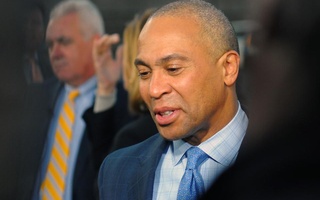UPDATED: September 22, 2014, at 2:00 a.m.
Harvard unveiled a new policy to dramatically rework its handling of sexual assault and harassment claims this July, but several weeks into the semester, the office in charge of investigating those cases is still not fully staffed.
Tucked away on the ninth floor of the Smith Campus Center, the new Office for Sexual and Gender-Based Dispute Resolution employs just one full-time investigator, William D. McCants, who started at Harvard in August. He’s joined by two assistants and University Title IX Officer Mia Karvonides, who oversees the office, in addition to a handful of office staff.
But the new office, which is solely responsible for investigating the sexual harassment complaints of students from all of Harvard’s schools, is still looking for two full-time investigators to work alongside McCants. Those positions remain vacant at a time when studies suggest students are particularly at risk for sexual assault—the start of freshman year. It is unclear how many, if any, cases have been brought before the office so far.
University officials have called the professional investigators’ role “extremely important and sensitive” and acknowledged that the market for qualified candidates is competitive.
{shortcode-9a4f610e1a9c932f8ca0e607bdb2962ae63cdd8f}
Experts echo that assessment, suggesting that competition from other institutions will prove an obstacle to Harvard as it strives to fill out its staff. Many institutions, like Harvard, are scrambling to hire new personnel as they face federal scrutiny into their adherence to Title IX, the anti-sex discrimination law that governs how universities respond to cases of sexual harassment.
“The demand for qualified operatives significantly exceeds the supply,” said Peter F. Lake '81, a professor at Stetson University College of Law who specializes in higher education law. “It’s a wild hiring market right now.”
Given that hiring market, Lake said, colleges will need to invest significantly to attract qualified investigators. According to recent online job postings for the two vacancies in the ODR, Harvard’s proposed salary range—between $70,000 and $119,900—is lower than what the school is willing to pay a spokesperson for the Faculty of Arts and Sciences or a senior official at Harvard Planning and Project Management.
{shortcode-575518440e5825a17d0de7100894fdc199c0fa77}
That salary offer could make it difficult for the University to attract attorneys with sufficient experience to investigate Title IX cases, said Kevin Powers, a partner at the Boston-based employment and civil rights law firm Rodgers, Powers, and Schwartz.
“At this price range, you can get someone who is an employment lawyer, but you’re not going to get someone who’s an experienced employment lawyer, and that’s the difference,” Powers said. “What they really want to do if they’re serious is to pay more.”
In an emailed statement, University spokesperson Jeff Neal defended the posted salary range. Harvard set the pay grade after looking at salaries of those in similar positions at other schools and organizations, he wrote. When asked, Neal did not comment on the challenges the University has faced so far in the hiring process but wrote that the office will make temporary hires to supplement full-time staff if the need arises.
A request for comment from Karvonides, who has not spoken with The Crimson on the record in 2014, went unanswered. Upon arriving to an interview scheduled by McCants’s secretary, a reporter was told by the secretary that the meeting was cancelled and referred to Harvard’s Office of Public Affairs and Communications.
At a town hall-style meeting earlier this month, Karvonides acknowledged that there is a limited supply of professionals in the field.
Read more in College News
On-Campus Interview Participation DropsRecommended Articles
-
Harvard Professor Receives Mail BombInvestigators are still working to determine who sent a bomb to the home of a Medical School faculty member last
-
Arsonists Set Fire to Papers in MatherWhen the fire alarm started sounding Sunday morning, Dana M. Casaus ’02 woke her roommate, grabbed her thesis, and opened
-
2 Dead, 1 Wounded in Dunster Murder-SuicideA Dunster House resident went on a stabbing spree this morning, fatally wounding her roommate, injuring a visitor and then
-
Investigation Continues In Yale HomicidePolice said yesterday that the death of Annie Le—the Yale graduate student whose body was discovered stuffed into the basement
-
Prosecutors Allege Pre-Murder 'Drug Rip'In a prelude to the robbery in Kirkland House that ended in Justin Cosby’s death, alleged gunman Jabrai Jordan Copney and his alleged accomplice Blayn Jiggetts are said to have stolen a large quantity of marijuana from two Yale undergraduates in 2008, according to court documents.
-
 Video May Be Clue to Bombing
Video May Be Clue to Bombing













